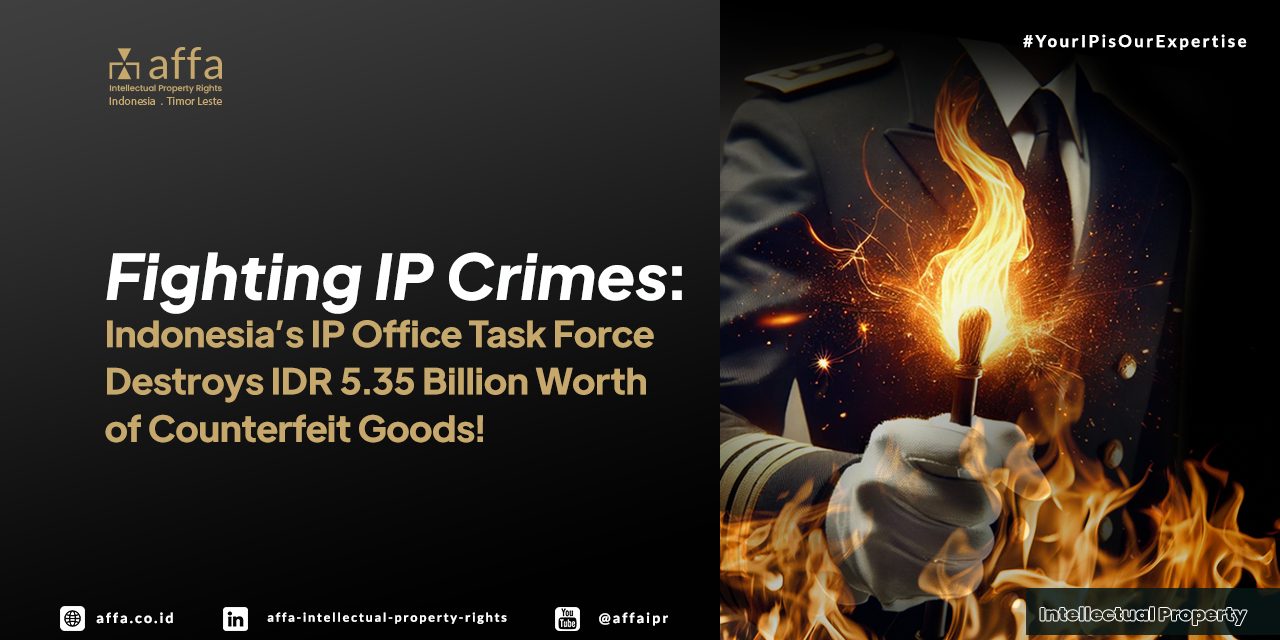The Indonesian Intellectual Property (IP) Task Force, a cross-ministerial special task force of the Republic of Indonesia, consists of the Directorate General of Intellectual Property (DGIP), the Directorate General of Customs and Excise (DGCE), the National Agency of Drug and Food Control (BPOM), the Ministry of Communication and Digital (Komdigi), the Criminal Investigation Department (Bareskrim) of the National Police, and the National Cyber and Crypto Agency (BSSN). On December 12, 2024, the task force symbolically destroyed a number of products associated with violations of 12 Trademarks and Industrial Designs.
During a press conference, the Director General of Intellectual Property, Razilu, stated: “This destruction serves as a strong message from the DGIP that there is no room for Intellectual Property violations in Indonesia.”
At least three key messages were conveyed through the destruction of these products:
- Deterrence:
To provide a deterrent effect on offenders, ensuring they refrain from committing further violations. Both civil and criminal legal actions can be enforced against them. - Creator and Owner Protection:
To assure creators and IP owners that their works are protected, fostering an environment where they can continue innovating. - Public Awareness:
To urge the public never to buy counterfeit or fake goods at low prices, as these products can adversely affect health, employment, and the environment.
The destroyed products, valued at IDR 5.35 billion, included the following:
- LEGO (toys): Worth over IDR 1 billion, from 110 items.
- Comotomo (baby bottles): Worth over IDR 500 million, from 888 items.
- Mimi White (hand and body lotion): 216 items.
- MT NG Shan (drill bits): 2,000 pieces.
- Louis Vuitton (women’s bags, wallets, and belts): 10 items.
- Christian Louboutin (women’s shoes): 2 pairs.
- Tokai (lighters): 5 boxes.
- Orion Choco Pie (snack/biscuits): 50 boxes.
- Honda (spare parts): 30 boxes.
- Honda (generators): 30 units.
- Harley Davidson (apparel accessories, umbrellas, and wallets): 600 items.
- Food Packaging (Industrial Design): 30 boxes.
It is important to note that the products classified as IP violations are not limited to counterfeit goods but also include goods illegally entering the Indonesian market. Under the law, smuggled goods that bypass official channels, fail to adhere to applicable import procedures, and are subject to objections by the official license holders of the relevant trademarks are subject to enforcement actions.
Given the complex and extensive scope of IP violations, cross-sector enforcement is required. The specific roles of the involved institutions are as follows:
- DGIP:
Monitoring, supervision, preventive measures, mitigation strategies, and enforcement of IP laws. - DGCE:
Addressing the importation of goods suspected of infringing IP rights. - BPOM:
Managing the distribution of food and pharmaceutical products that are suspected of infringing IP rights and endangering public health and the environment. - Komdigi:
Handling complaints and requests for blocking websites related to goods and/or services deemed to violate IP rights. - Bareskrim Polri:
Coordinating communication and collaboration for law enforcement from the central office to its units across Indonesia. - BSSN:
Monitoring IP violations in cyberspace and assisting in handling IP infringements that occur in the digital realm.
You might also want to read:
Unraveling the Global Complexity of IP Crime: Money Laundering and More!
Each year, the average number of reports on IP violations is around 50 cases, with the majority involving Trademark, Industrial Design, and Copyright infringements. The active role of Komdigi has also significantly contributed to blocking 414 websites infringing Copyrights based on 16 requests. However, considering that the IDR 5 billion in damages mentioned earlier came from only 12 cases, this can be seen as just the beginning or the tip of the iceberg in the enforcement of IP laws in Indonesia.
Therefore, the participation of the five key components of the nation—Government, Academics, Private Sector, Society, and Media—is expected to continue supporting efforts to create a better Intellectual Property climate in Indonesia.
With increasing public awareness of the importance of Intellectual Property, there will also be positive impacts on the national economy and Indonesia’s investment climate in the global arena.
Should you need more information regarding Trademark protection and other Intellectual Property matters in Indonesia and abroad, feel free to contact us via email at [email protected].








1 Comment